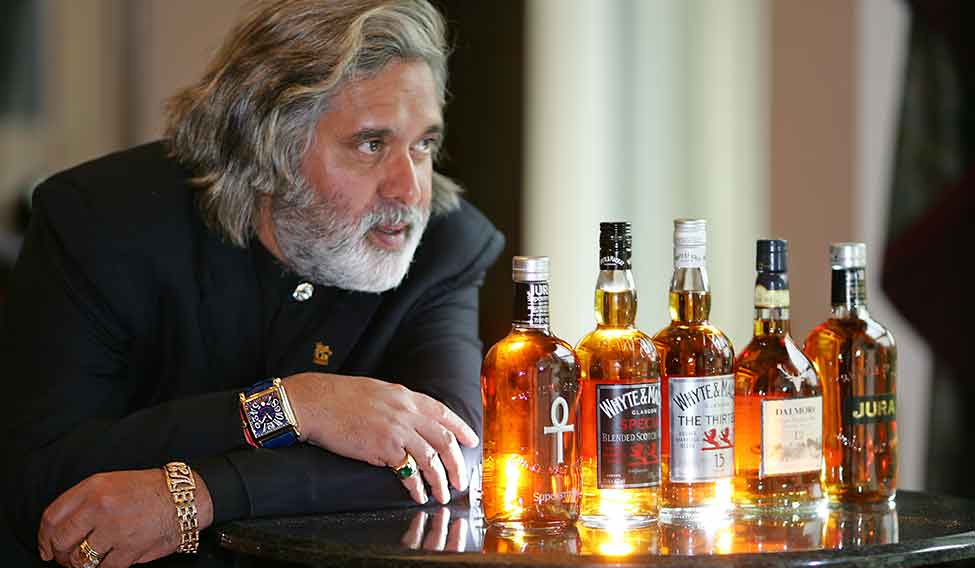Vijay Mallya was 28 when his father, Vittal Mallya, died and he became chairman of UB Group. It was 1983, and the group’s primary business was selling alcoholic beverages, although it had diversified into the ‘more respectable’ pharma, petrochemicals and agrochemical sectors.
The breweries under UB Group were then selling around 2.85 lakh cases of liquor a year. After he took over as chairman, Vijay Mallya consolidated the various companies under the group, and unabashedly focused on the core business of manufacturing and selling liquor. Revenues grew as he expanded operations and brought in innovations in product development and marketing strategy. In 1991, McDowell’s, the group’s umbrella spirits brand, acquired the spirits business of liquor major Forbes Campbell & Company. The following year, McDowell’s expanded its portfolio, which had comprised whisky, brandy and rum, to include its first single malt, duet gin and vodka variants.
The acquisitions continued. In 2006, McDowell’s, Herbertsons, Triumph Distillers, Vintners Private Ltd, Baramati Grape Industries India, Shaw Wallace Distilleries and four other liquor companies were merged to form United Spirits Ltd (USL). The same year, Mallya acquired Bouvet Ladubay, a subsidiary of the French champagne house Taittinger.
By 2008, USL had bought Liquidity Inc (the US-based makers of the famous Pinky Vodka) and Whyte & Mackay (the UK’s leading Scotch whisky distillers) to become the world's third largest spirits group, after Diageo of Britain and Pernod Ricard of France. In 2008-09, it clocked sales of 90 million cases, a 20 per cent growth over the previous year. USL had become the jewel in Mallya’s $3-billion UB Group crown.
And then, it all fell apart. The mounting operational losses of Kingfisher Airlines, launched in 2003 with much fanfare, signalled the end of good times. Mallya had borrowed thousands of crores from a consortium of banks to keep the airlines up and running. But it ultimately became insolvent and, in 2012, shut down operations after the Director-General of Civil Aviation suspended its flight certificate. The following year, its licences were revoked, and the banks began declaring him a ‘wilful defaulter’.
Apart from defaulting on loans, Mallya was accused by GMR Hyderabad International Airport of cheating and non-payment of charges. On March 14 this year, a Hyderabad court issued a non-bailable warrant against Mallya for dishonouring four cheques issued towards user charges. “Non-bailable warrants were issued earlier also,” said Ashok Reddy, legal counsel of GMR. “There are about 11 cases we have against Kingfisher Airlines for non-payment of dues of over Rs 8 crore.”
In an effort to ease the debt burden and keep the airline solvent, Mallya had pledged shares of USL to the banks and is said to have diverted resources from USL to Kingfisher Airlines. With him absconding, banks have started to offload the stocks. On March 14, HDFC Bank raised Rs 71 crore by selling USL shares. “Banks have already sold Rs 1,244 crore worth of USL shares,” said market analyst Chandan Taparia. “Another Rs 1,250 crore is stuck in courts.”
Banks are also likely to pursue Mallya’s 32.8 per cent stake in United Breweries Ltd, which is valued at Rs 6,724 crore. But UB Group sources said around 48 per cent of these shares were already pledged by Mallya to German beer-maker Heineken, which is now the largest shareholder in United Breweries. “Though recovery from Mallya's personal assets would be limited to the extent of guarantees he has signed, banks can recover the balance from United Breweries Holdings Limited, which is a guarantor in these loans,” said lawyer and banking expert Saket Sharma.
In 2012, Diageo acquired USL and Mallya was asked to step down from the board after an internal inquiry found that he had been involved in financial irregularities. Mallya refused to step down, and it led to a legal battle.
In 2014, Diageo raised its stake in USL to 54.78 per cent, buying 26 per cent stake from public shareholders. It signed an agreement with Mallya, whereby the company will pay $75m over a five-year period ($40m immediately, and the rest over five years). As per the agreement, Mallya resigned from his position as chairman and non-executive director of USL and other group companies. He is bound by a five-year global non-compete, non-interference and standstill clause.
The agreement says Mallya will have an honorary title of ‘founder emeritus–USL’, without any authority, responsibility, rights or benefits. His son, Sidhartha Mallya, will be on the board of the Royal Challengers Sports Private Ltd, the holding company of the Indian Premier League franchise Royal Challengers Bangalore, for a period of two years or for the term RCB remains part of the USL, whichever ends earlier.
With Mallya effectively evicted from the company he built, Diageo is all set to relaunch USL. “Diageo is trying to relaunch different brands under the United Spirits portfolio,” said Abneesh Roy, associate director at Edelweiss Capital. “But I do not expect a sudden increase in volumes, as direct advertising is not allowed…. But I feel this relaunch effort will yield results.”





